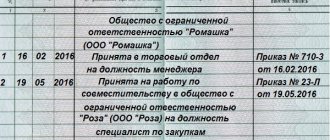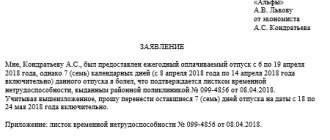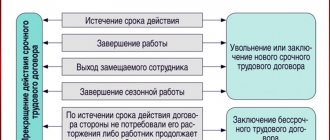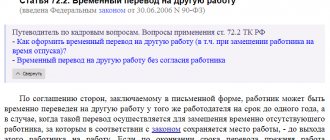The grounds for termination of an employment contract are: 1) agreement of the parties (Article 78 of this Code); 2) expiration of the employment contract (Article 79 of this Code), except for cases where the employment relationship actually continues and neither party has demanded its termination; 3) termination of an employment contract at the initiative of the employee (Article 80 of this Code); 4) termination of an employment contract at the initiative of the employer (Articles 71 and 81 of this Code); 5) transfer of an employee, at his request or with his consent, to work for another employer or transfer to an elective job (position); 6) the employee’s refusal to continue working in connection with a change in the owner of the organization’s property, a change in the jurisdiction (subordination) of the organization or its reorganization, or a change in the type of state or municipal institution (Article 75 of this Code); 7) the employee’s refusal to continue working due to a change in the terms of the employment contract determined by the parties (part four of Article 74 of this Code); the employee’s refusal to transfer to another job, required for him in accordance with a medical report issued in the manner established by federal laws and other regulatory legal acts of the Russian Federation, or the employer’s lack of relevant work (parts three and four of Article 73 of this Code); 9) the employee’s refusal to be transferred to work in another location together with the employer (part one of Article 72.1 of this Code); 10) circumstances beyond the control of the parties (Article 83 of this Code); 11) violation of the rules for concluding an employment contract established by this Code or other federal law, if this violation excludes the possibility of continuing work (Article 84 of this Code). An employment contract may be terminated on other grounds provided for by this Code and other federal laws.
2) expiration of the employment contract (Article 79 of this Code), except for cases where the employment relationship actually continues and neither party has demanded its termination; 3) termination of an employment contract at the initiative of the employee (Article 80 of this Code); 4) termination of an employment contract at the initiative of the employer (Articles 71 and 81 of this Code); 5) transfer of an employee, at his request or with his consent, to work for another employer or transfer to an elective job (position); 6) the employee’s refusal to continue working in connection with a change in the owner of the organization’s property, a change in the jurisdiction (subordination) of the organization or its reorganization, or a change in the type of state or municipal institution (Article 75 of this Code); 7) the employee’s refusal to continue working due to a change in the terms of the employment contract determined by the parties (part four of Article 74 of this Code); the employee’s refusal to transfer to another job, required for him in accordance with a medical report issued in the manner established by federal laws and other regulatory legal acts of the Russian Federation, or the employer’s lack of relevant work (parts three and four of Article 73 of this Code); 9) the employee’s refusal to be transferred to work in another location together with the employer (part one of Article 72.1 of this Code); 10) circumstances beyond the control of the parties (Article 83 of this Code); 11) violation of the rules for concluding an employment contract established by this Code or other federal law, if this violation excludes the possibility of continuing work (Article 84 of this Code). An employment contract may be terminated on other grounds provided for by this Code and other federal laws.
Part lost force on October 6, 2006 - Federal Law of June 30, 2006 N 90-FZ.
"Correct" article
Despite the basic basic principles of legal acts, namely “absolute clarity in wording,” misunderstandings very often arise. Under what article should dismissal be made? Clause 3 Art. 77 or art. 80 Labor Code of the Russian Federation?
But in fact there is no problem in understanding here. One is considered procedural (how to legally change jobs correctly), and clause 3 of Art. 77 of the Labor Code of the Russian Federation – normative, i.e. indicates the fact itself.
Almost everyone knows that you need to work for 2 weeks before leaving the organization. Let us immediately clarify one very important nuance.
Dismissal (clause 3 of Article 77 of the Labor Code of the Russian Federation) does not provide for any work.
You just need to notify the employer no later than this period. Of course, during this period you will have to perform your functions at the enterprise. Hence the erroneous opinion. But let us clarify that compulsory work for half a month is optional.
You can go on sick leave or vacation, warning your employer about future dismissal. In this case, there can be no processing.
Registration of the contract
If a controversial situation arises, the employer should not complicate the current situation with lengthy negotiations, resolutions or other means, since one can immediately begin to directly consider the terms of termination of the employment contract. In large organizations, the document in question is created in advance in a free form. This greatly simplifies the dismissal procedure. The procedure for drawing up a document is to a small extent influenced by who initiated the termination of a previously concluded contract.
The agreement in question is characterized by a large number of different advantages. They are as follows:
- The contract specifies both parties for their identification: information about the employee and details of the employer. The information is established according to the sample employment contract.
- The employer may pay compensation. An example is a case where dismissal is carried out in the event of a reduction in staff, and the employee was not warned about this.
- Reflect other conditions. There is often a situation where, after the termination of the relationship between the employer and the employee, certain conditions must be met, for example, confidential information cannot be disclosed. Typically, such a clause is specified in the employment contract, but can also be stipulated upon dismissal.
- There is no need to coordinate actions with trade union organizations. This positive point greatly simplifies the work of managers of large companies.
With such an agreement, the employee has its own significant advantages. At the time of ordinary dismissal, the intended amount can be paid in parts, in the case under consideration - all at once. In addition, the employee is not required to notify the employer two weeks in advance, as specified in the Labor Code of the Russian Federation.
The agreement is considered a bilateral document and is drawn up in two copies for the employer and employee. Both papers, which must be originals, are signed. The agreement in question must be concluded exclusively in writing , thereby ensuring the safety of both parties.
Clause 3 art. 77 Labor Code of the Russian Federation: entry in the work book
The most common mistake is incorrect entry. Very often, clerks incorrectly indicate the article in the work book. After this, many former employees face a problem during new employment or when applying for a pension. Clerks put Fr.
But the legislation does not provide for the termination of obligations on the basis of this article. It is important to see the order to terminate the contract. If it is based on the same article, then legally the employee is not fired, because legal procedure was not followed.
Hence the problem for the former employee: he may not be hired for the new position. It is imperative to contact your former organization for correction. The document must contain the following entry: clause 3, part 1, art. 77 of the Labor Code of the Russian Federation (termination of an employment contract at the initiative of the employee).
But let's move on to another common mistake.
Is it possible to withdraw an application?
If, during a two-week work period, an employee changes his decision regarding his upcoming dismissal, nothing prevents him from revoking the document. This is quite simple to do: you need to write a petition in which you must indicate a request to cancel the previous application.
However, the second application will not be satisfied if a new candidate has already been found for this job. The former employee will be automatically dismissed, and the new employee will begin to fulfill his obligations.
Clause 3 Art. 77 Labor Code of the Russian Federation: entry into the labor record. Writing sample
Clerks and directors often face a similar problem. The article seems to be indicated accurately, but the entry is still invalid. The fact is that the wording is as follows: “P. 3 tbsp. 77, dismissal of one’s own free will.”
But according to the rules for filling out the entry must fully comply with the norms of the Labor Code of the Russian Federation.
Therefore, the writing sample will look like this: “Dismissed under clause 3 of Art. 77 of the Labor Code of the Russian Federation - termination of an employment contract at the initiative of the employee.”
The record is radically modified, although the underlying reason remains the same.
Application for resignation
This type of paper is drawn up by the applicant himself in free form. You can submit an application in any form. This means that the text can be provided on white A4 paper in printed or written form. However, it is worth remembering the necessary information that must be present.
Despite the lack of a uniform form of writing, it is worth following a certain template to avoid mistakes. So, the structure of the statement could be as follows:
- Full name of the person to whom this paper will be sent;
- Full name of the hired worker (author of the application);
- Explanation of the reasons for leaving work: at your own request;
- Date of termination of the employment contract (last day of work);
- The date the petition was written and the signature of the originator.
You can also find a form to fill out online, then print it out and fill in your personal information.
Consent of the parties: what is the difference?
There are situations when an employee is forced to write a letter of resignation of his own free will. The reasons, of course, are purely individual. The new director is selecting personnel, the employee is no longer happy, there is a reorganization, pregnant women are often forced to do this, etc. The Labor Code has two paragraphs of Article 77, which seem equivalent to ordinary citizens:
- By agreement.
- At your own request.
Many professional lawyers involved in labor disputes know that termination of a contract in the second case can be challenged in court. It is enough to provide arguments and prove that the employee was subjected to psychological influence by the administration of the enterprise. Consequently, the termination order will be canceled in court, and the employee will be reinstated with all rights.
Clause 1 art. 77 of the Labor Code of the Russian Federation does not provide for such a loophole. It just follows from the fact that the employee and the employer have any conflicts and disagreements.
As a rule, the former employee is paid some kind of “compensation” funds in order to terminate the employment relationship peacefully and without consequences for both parties. In court, all arguments will be useless. It is almost impossible to regain your labor rights.
Payments after dismissal
Dismissal by agreement of the parties provides for the payment of compensation, which can be agreed upon in advance between the employer and the worker. If the employee does not agree with the accrued amount, Article 140 of the Labor Code of the Russian Federation may come into effect. If this document was used as the basis for assigning the amount of compensation, then it cannot be challenged.
Upon termination of the contract between the employer and the hired worker, the following compensations are issued:
- In case of unused vacations for the entire period of work, they are paid in full.
- Unpaid wages for the last days of work or withheld funds for the entire period of employment.
- Compensation related to the termination of the concluded contract. This item is often indicated separately.
If the organization's regulations provide for payment to a former employee, and it was not carried out, then after dismissal he can sue his manager. The most difficulties arise in the case when vacation was not used during the year or the entire period of work.
When calculating the intended amount, the average earnings are taken into account.
If you change your mind, what should you do?
Such cases are also not uncommon. The reasons can be different: there was no agreement on a new place of work, the director realized that the employee really wanted to leave, and improved working conditions and much more.
To cancel an application that has already been submitted, you must write and also officially register a new one in accordance with all the rules. No matter how good the relationship between him and the employer may seem to the employee, it is important to know the main rule: the application for refusal of dismissal must be submitted officially, i.e. in writing through a secretary or by mail.
If a pensioner resigns
Having reached a certain age, a person can count on financial support from the budget. In this case, termination of work is permissible. The dismissal procedure is no different from the classic scheme. All you have to do is write a statement and submit it to your employer.
Video
However, exceptions are provided for working off. A person reports that he is stopping work due to retirement; he has the right to leave at any convenient time, even if the work has not been completed. However, if the person subsequently re-enters the workforce, he or she can no longer use this benefit.
What is it for?
There are often cases when the employer is not against such dismissal. But he had no reason to do it himself. And then the employee himself brings such a letter of resignation under clause 3 of Art. 77 Labor Code of the Russian Federation.
Then after some time the employee announces that he has changed his mind. The director, knowing the legislation, says with joy on his face that “I understand everything, continue working.”
After a two-week period from the date of writing the application, a dismissal order is issued in accordance with clause 3 of Article 77 of the Labor Code of the Russian Federation - at one’s own request.
There is no use going to court. Legally, the director did everything correctly. One of the principles of law was at work here: “Most moral principles become legal norms, but not all.”
When refusing an application of your own free will, there is one very important nuance. If, from the moment the employee was fired until his refusal, a written invitation was sent to another person to accept this position, then it will no longer be possible to cancel it.
Here the law will be on the side of the future employee, i.e. someone who has already been invited. Because Now no one has the right to refuse him employment.
Therefore, it is necessary to weigh everything carefully before writing a letter of resignation. There are times when there is no way back.
Severance pay
There is some difference between the two similar concepts of “compensation payment” and “severance pay”, which is not obvious to everyone. Usually, in practice, only HR employees and lawyers of organizations can figure this out. The main difference is that compensation is transferred when dismissal occurs on the initiative of the employee himself. In this case, severance pay is due to those with whom the contract is terminated at the request of the employer.
The law establishes the minimum amount of severance pay, while maximum payments are sometimes established by local acts of organizations and companies, or in a collective agreement.
Let's consider how this benefit is calculated when the company's workforce is reduced? The Labor Code establishes the following rules:
Free legal consultation
Free legal consultation We will answer your question in 5 minutes!
Ask a Question
We will answer your question in 5 minutes!
Ask a Question
- the employee receives a salary and one average monthly salary on the day of dismissal;
- if you could not find a new position, then two more similar payments are transferred for 2 months;
- in case of registration as unemployed, the total benefit is transferred for 3 months;
- if an employee worked in difficult climatic conditions (RCC), then he is entitled to a six-month severance payment (if he is registered with the employment center).
Agreement of the parties
If the wording indicated in the work book states that the employee was dismissed “by agreement of the parties,” then this indicates special conditions for the transfer of severance pay.
Example
For example, the amount of benefits is discussed between the employee and the boss on an individual basis. All this is included in a written agreement, which must be signed. This document is transferred to the accounting department, and severance pay is calculated on its basis.
The acceptance of an employee for a probationary period deserves special attention. If he fails and is recognized as having failed, then no benefit is due for payment.
Calculation of benefit amount
To roughly calculate the amount of compensation or dismissal benefits, you must first determine the average daily earnings. To do this, you need to take 12 months of salary (not including the month of termination of the contract) and divide it by the number of working days. Be sure to deduct holidays, vacations and sick leave from them, if any.
This is also important to know:
Dismissal for health reasons: is it possible, procedure for registration
Benefits usually differ because each month has a different number of working days. It is important to note that personal income tax will not be charged on these payments, since they are not considered pure income. However, if the contract is terminated by agreement of the parties, then the tax on severance pay will have to be transferred in the usual manner.
Where to defend labor rights
If during the dismissal procedure or in any other case that arose during the employment relationship, your rights were violated, then you need to defend them in one of the following ways:
- Contacting the Labor Rights Protection Inspectorate.
- Statement of claim to court.
- Contacting the prosecutor's office.
A citizen of the Russian Federation whose rights have been violated may appeal simultaneously to all competent authorities. Administrative punishment is provided for the guilty person. But the citizen himself does not have the right to initiate such a case through the court. This can only be done by either the prosecutor's office or the labor inspectorate. To do this, you need to send a complaint to these structures.
In parallel, the employee has the right to file a lawsuit in order to receive compensation for moral damage or any other payment from the employer, if provided by law, because administrative sanctions do not provide for this. All fines issued by the prosecutor's office will go to the state. Therefore, it is better to contact the regulatory authorities in order to bring the offender to justice and go to court for moral or other payments.
Procedure in case the employer is against dismissal
There are situations when, due to a shortage of personnel or for some objective or subjective reasons, management does not agree with the resignation of an employee, preventing his attempts to submit an application. Such behavior by the employer is, of course, unlawful, but the employee may be confused, not understanding how to get out of this situation. Article 77 paragraph 3 of the Labor Code of the Russian Federation gives any employee the right to resign at will. No motives of the employer should influence the will of the citizen. It is necessary to formalize the dismissal correctly in accordance with the Labor Code of the Russian Federation, and then no actions (inaction) of the employer will allow the employee to stay at the place of work longer than necessary. This is the algorithm for an employee’s behavior if the employer interferes with his dismissal by rejecting the application. First, you need to send your resignation letter in such a way that the manager cannot avoid receiving it and certifying such receipt. This can be done in three ways, the features of each of which should be mentioned separately.
- The first method: to endorse the application at the secretariat or office of the organization, or another department that registers correspondence. It is important to keep a copy of the resignation letter, which should include the document number. There must also be the date, surname, initials, signature and position of the office employee who accepted this application. This method is the simplest for ordinary dismissal, and the most difficult if the employee is faced with obstacles when changing jobs.
- The second way: use postal delivery. You can send your resignation letter by registered mail or a letter with a declared value and an inventory of the attachment. Sending correspondence by mail must be registered, and the citizen also receives a receipt confirming the sending. In addition, you can send a letter with acknowledgment of receipt in order to know exactly when the employer received the application in hand and to have documentary evidence of this. The only nuance you need to know when sending an application by mail is that the manager will be officially notified of dismissal only the next day after receiving the letter. The two weeks that must be worked before dismissal will begin to be calculated only from the specified period. Therefore, when indicating the date of dismissal in the application, you must first check with the post office the date of delivery of the registered letter.
- Third way: send a telegram. This option is also possible, and, as you know, the delivery time for telegrams is much shorter than the delivery time for a letter. An urgent telegram is delivered in 4 hours, an ordinary telegram in 8 hours. The telegram must contain the full text of the statement. It is also advisable to obtain a copy of it for yourself with a shipping mark, date and seal.
Secondly, after sending the application using one of the indicated methods, it is necessary to continue working as before until the date written in the application, without disrupting work. discipline. On the last day of work, the manager is obliged to hand over the work book and make a cash payment. Afterwards, the employee may not go to work. If the manager refuses to hand over the work book and does not pay the employee, then he does not comply with the dismissal procedure established by law. Thus, he violates the employee’s right to voluntary dismissal, established in Article 77 p3 of the Labor Code of the Russian Federation. An employee can always appeal against actions or inactions of management if he believes that his rights have been violated. There is no reason in the law for an employer to refuse to resign an employee on his own. For refusal to accept an application (if the employee manages to prove the intentionality of the actions and the fact of the refusal itself), as well as for any violation of the law by establishing obstacles to the dismissal of an employee, a fine is provided (Article 5.27 of the Administrative Code). The employee has the right to submit:
- application to the workers' union;
- complaint to the Federal labor and employment service;
- a complaint to the prosecutor's office;
- lawsuit.
So, if the manager does not want the employee to quit and tries to prevent him from leaving the organization without accepting a resignation letter, competent actions will help the employee exercise his right (Article 77 p. 3 of the Labor Code of the Russian Federation) and resign on time. If the dismissal was not formalized within the required period, then in court you can recover moral damages from the employer, as well as oblige him to cover the expenses that resulted from the delay in dismissal. If the manager does not issue a work book, through the court you can recover an amount equal to the average earnings for each day of delay in issuance.
Cases exempt from service
The Labor Code contains reasons that allow an employee to leave before the due date of 14 calendar days. Let's say right away that the report begins the next day after the relevant notification is submitted.
These include:
- Employee training.
- Mutual agreement.
- Violation of labor rights.
- Other.
The first two are more or less clear. As for violation of labor rights, what is meant is not the subjective opinion of the employee. This refers to the official holding of the employer to responsibility. And it must necessarily concern the employee who decided to leave earlier than expected.
How to avoid detention
As already mentioned, the general notice period of intention to terminate the contract is 2 weeks. In some cases, the law allows you to shorten the period between notification to the employer and the end of the activity.
Such exceptions include the following cases:
- the employee is accepted under the condition of a probationary period - the warning must be received 3 days before leaving;
- the employer violated labor legislation, as a result of which the employee’s interests were harmed - the employee himself has the right to choose the period of work;
- The parties to the labor relationship are mutually interested in reducing the working period and have come to an agreement on this issue. This usually happens if the employer wants to quickly replace the employee with another specialist, and he does not mind leaving earlier;
- the employee was admitted to an educational institution, studies in which do not allow him to continue working in the organization. Documentation of admission must be submitted;
- the employee has a registered disability or disabled children in need of care. The fact of obvious deterioration of the condition, noted by doctors, is also important. The law allows in these cases to resign before the expiration of 14 days from the date of notification to the employer;
- the citizen was called up for military service;
- the employee (worker) is forced to move after his spouse, in respect of whom there is an order for a long-term transfer to another location;
- the citizen is sick, as evidenced by the sick leave certificate. During the period of incapacity, you can quit without working. In such a situation, the days reflected on the sick leave will replace the working period.
When will the payment be made?
After an official order, all payments for time worked must be made on the day of dismissal. And this is not a “gift” from the company, it is an obligation according to the Labor Code. Violation of this norm is a reason to defend your rights and contact regulatory authorities. In addition to salary, the employee is entitled to payment for unused vacation. You can calculate it yourself if you know your average monthly earnings and the exact number of days worked. Payments under it must also be made on the day of the dismissal order.
The only exception to this rule is sick pay. From the moment the medical certificate is provided, the accounting department recalculates within 10 days and pays it on payday at the enterprises.
If the employee is not on site on the day of payment (business trip, vacation, sick leave), then all payments must be made no later than one day after his request.
Entering data into documentation
Initially, the information is recorded in a personal card. It is drawn up in form T-2. The entry is certified by the signature of the personnel officer. The completed document is provided to the employee for review. The person confirms the information by signing.
Video
Additionally, the accounting department draws up a calculation note. It is drawn up according to the T-61 form. The document reflects information about payments due to the employee. Then the work book is filled out. It reflects the fact that a person works in a certain organization and records information about dismissal.
You need to write:
- Company name;
- the moment the employee was hired and his position;
- information about the contract and other grounds for employment;
- date of dismissal and reasons for termination;
- seal impression and signature of the HR employee;
- citizen's signature.
When filling out documents, use correct wording.









